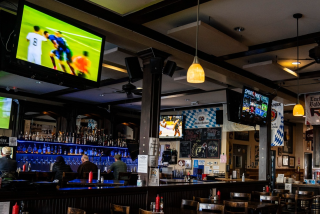The premier soccer league in the U.S. is English
- Share via
It’s just past 8 on a sparkling morning, and John Laslett is sitting in a corner booth of a darkened English pub in Santa Monica, sipping tea and watching soccer on a small television hung from the ceiling.
“I love to get up Sunday morning and do this,” he says. “This is kind of a ritual.”
It’s not just any soccer that will draw the UCLA history professor emeritus out of bed. It has to be the English Premier League -- and not just because the British expat is homesick.
“The Premier League is a really fun league to watch,” he says.
It must be to get a man as educated as Laslett -- Oxford, class of 1962 -- up this early to watch lackluster Wolverhampton play equally uninspiring Sunderland, arguably the two worst teams in the league.
But then the English Premier League appears to be catching on all over the U.S.
“A lot of it has to do with people in our business taking a closer look at specifically the World Cup ratings and really coming to a better understanding of how strong the interest in international soccer is,” says Mike Mulvihill, a senior vice president for Fox Sports.
“Top to bottom,” he added “the quality of the Premier League is unmatched.”
Last month, Fox’s taped broadcast of a Premier League match between Chelsea and Liverpool drew nearly double the ratings of ESPN’s live coverage of the MLS Cup final, a match featuring the Galaxy and David Beckham. And that happened despite an increasingly crowded broadcast environment, one that this weekend will see nine networks air games from 10 countries -- including the clasico between Spanish powers Real Madrid and Barcelona on ESPN Deportes on Saturday and the Mexican Apertura championship between Tigres UANL and Santos Laguna on Telemundo on Sunday.
“I think the Americans see the English Premier League as the most interesting to watch,” Laslett says.
Top to bottom the league is far more balanced and, according to UEFA’s league coefficient, much stronger than Spain’s La Liga, Germany’s Bundesliga and Italy’s Serie A. That, however, is only part of the draw, says Raul Dourago, the Dublin-born bartender who controls the TV remote at Ye Olde King’s Head, Laslett’s Sunday morning man cave.
“I think a lot of it is probably the size of a lot of the clubs. The history and the tradition of it,” says Dourago, standing behind his bar and beneath more than a dozen supporters’ scarves of Premier League teams. “More appeal and more recognition I guess.
“I don’t think the Spanish League is as exciting. We’ll put on Barcelona and Madrid whenever they’re playing. But if it’s Racing Santander and Valencia, it doesn’t look that exciting. It’s a two-horse race in Spain.”
The growing U.S. infatuation with the English Premier League has been good and bad news for the top professional league here. Because although the Premier League has siphoned off TV viewers, it has also grown the number of soccer fans across the country.
“The success of the Champions League and the Premier League is good for Major League Soccer,” MLS Commissioner Don Garber says. “We’re creating a growing market of soccer fans who then we can convert into being fans of a local MLS team as opposed to trying to convince them to be soccer fans.
“While at times it can be perceived as competitive, in my view, in many ways, all those other programmers and properties are helping to build the sport for us.”
Television ratings aren’t the only place where the 16-year-old MLS trails the Premier League, which is more than 100 years older. Over the last year, the Premier League’s 20 teams paid about $113 million just to player agents. That’s more than the 18 MLS teams paid in total salary last season.
There’s a wide talent gap too -- one that’s grown since seven players who have been called up by the U.S. national team in the past year have forsaken MLS for the Premier League. Among those is former New England Revolution midfielder Clint Dempsey, whose score for Fulham earlier this month gave him a U.S.-record 37 Premier League goals in 161 appearances since 2007.
“Aside from just the action on the pitch, the passion that you see in the Premiership, it’s unique,” Mulvihill says. “It’s something that really draws American fans in. The pageantry of it. The intensity of it.
“And I think that’s partly what gets people not just to the set in their homes but gets them out to the pubs at 7:30 on a [weekend] morning.”







